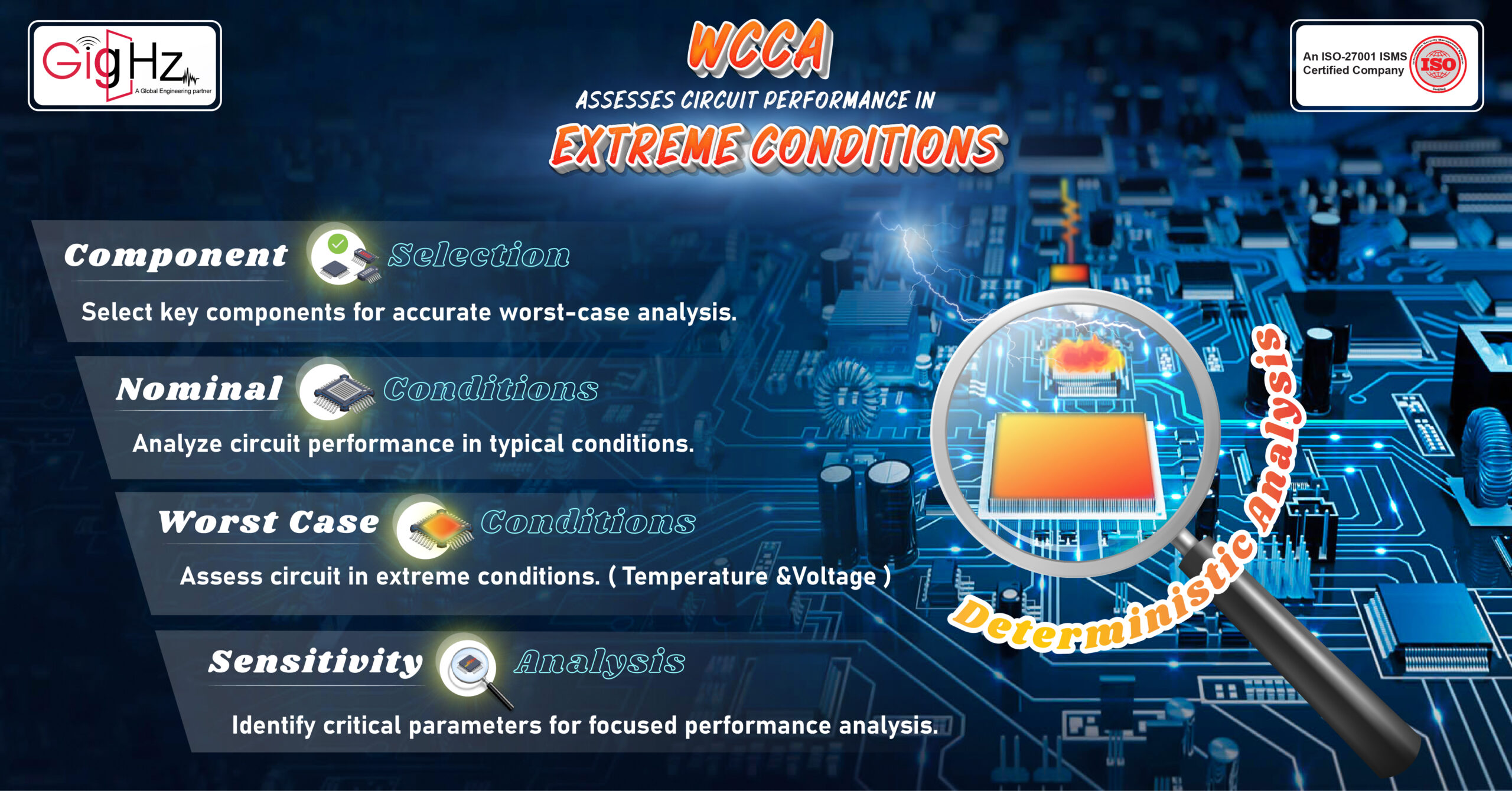WCCA Methodologies and Approaches in Worst Case Circuit Analysis
Imagine the creation of an extraordinary autonomous vehicle, a technological marvel poised to revolutionize transportation. This cutting-edge innovation must navigate a wide spectrum of environmental challenges, from scorching desert heat to freezing arctic conditions. In the quest for unparalleled reliability and performance, engineers harness the power of Worst-Case Circuit Analysis (WCCA) during the design phase.

Imagine the creation of an extraordinary autonomous vehicle, a technological marvel poised to revolutionize transportation. This cutting-edge innovation must navigate a wide spectrum of environmental challenges, from scorching desert heat to freezing arctic conditions. In the quest for unparalleled reliability and performance, engineers harness the power of Worst-Case Circuit Analysis (WCCA) during the design phase.

Category :
Published Date :
October 21, 2023
Category :
Published Date :
October 21, 2023
Category :
Published Date :
October 21, 2023
WCCA serves as a formidable technique that enables them to anticipate and mitigate potential risks within the vehicle’s intricate electronic systems.
As these engineers meticulously scrutinize every aspect of the vehicle’s electronics, they embark on a journey into the realm of WCCA.
Through comprehensive simulations, they subject the circuits to extreme temperatures, voltage variations, and component sensitivities.
This meticulous analysis allows them to unravel vulnerabilities, identify weak points, and optimize the design to ensure robust and reliable operation in the face of adversity.
In this article, we delve into the diverse methodologies and approaches employed in WCCA, providing a comprehensive overview of the techniques used to evaluate circuits under worst-case conditions.
By understanding these methodologies, PCB designers can fortify their ability to proactively address challenges and safeguard the reliability of their designs.
Through WCCA, they can chart a course towards resilient electronic systems that effortlessly withstand even the most demanding environmental conditions.
This blog gives you an overview of WCCA under the following headings.
- Deterministic Analysis
- Statistical Analysis
- Temperature Variations Analysis
- Sensitivity Analysis
- Worst Case Combination Analysis
- Specialized Expertise in Outsourced WCCA Services
Deterministic Analysis

Definition and Purpose: It provides an explanation of deterministic analysis, highlighting its role in WCCA, which involves evaluating circuit behaviour under extreme conditions.
Component Selection: Learn about the process of selecting critical components for analysis to ensure accurate evaluation of worst-case scenarios.
Nominal Conditions: Understand how the circuit performs under typical operating conditions, serving as a baseline for comparison.
Worst Case Conditions: Explore the evaluation of circuit behaviour under extreme environmental conditions, such as high temperature or voltage variations.
Sensitivity Analysis: Identify the parameters that have the most significant impact on circuit performance, allowing for a focused analysis on critical factors.
Statistical Analysis
Introduction to Statistical Analysis: Gain insights into the role of statistical methods in WCCA, enabling the capture of variability and providing a robust analysis approach.
Probability Distributions: Explore common probability distributions like normal and uniform distributions, which aid in modelling uncertainties in component values.
Monte Carlo Simulation: Learn about the utilization of Monte Carlo simulation to generate random variables and simulate a range of component values and operating conditions.
Statistical Metrics: Understand key statistical measures such as mean, standard deviation, and percentiles, enabling the analysis of Monte Carlo simulation results.
Confidence Intervals: Discover how confidence intervals provide a range of possible outcomes, aiding in estimating the likelihood of worst-case scenarios and their associated risks.
Temperature Variations Analysis
Temperature Effects on Components: Investigate the impact of temperature on component characteristics and its influence on overall circuit performance.
Thermal Analysis: Understand the evaluation of circuit behaviour under varying thermal conditions to identify worst-case scenarios.
Temperature Coefficients: Learn about temperature coefficients, which quantify the change in component parameters with temperature variations, aiding in worst-case analysis.
Thermal Simulation Tools: Explore software tools used to simulate temperature variations and assess their impact on circuit performance.
Worst Case Temperature Scenarios: Identify critical temperature extremes such as high and low limits, enabling analysis of their effect on circuit functionality.
Read more about thermal Analysis from GigHz
Sensitivity Analysis
Sensitivity Analysis Basics: Gain an understanding of sensitivity analysis and its role in assessing the impact of parameter variations on circuit behaviour.
Parameter Variation: Explore the evaluation of how small variations in component values affect circuit performance by systematically varying each parameter while keeping others constant.
Sensitivity Metrics: Discover key metrics such as voltage transfer function sensitivity and impedance sensitivity, quantifying the relationship between parameter variations and circuit response.
Sensitivity Analysis Tools: Learn about software tools that facilitate sensitivity analysis, streamlining the evaluation of parameter sensitivities.
Design Optimization: Understand how sensitivity analysis results can be leveraged to optimize the circuit design by identifying critical parameters for component selection and design modifications.
Worst Case Combination Analysis
Definition and Purpose: Gain insight into worst case combination analysis, which involves identifying the most severe combination of parameters for worst-case scenarios.
Identifying Critical Scenarios: Explore the process of determining the combinations of parameters that lead to worst-case scenarios by considering their cumulative effects on circuit performance.
Worst Case Analysis Tools: Discover software tools used for efficient worst case combination analysis, enabling exploration of the parameter space and identification of critical scenarios.
Failure Modes and Effects Analysis (FMEA): Learn how to incorporate FMEA into worst case combination analysis, assessing potential failure modes and their impact on circuit functionality.
Mitigation Strategies: Explore approaches for mitigating risks identified through worst-case combination analysis, such as redesigning critical components or introducing redundancy to improve overall reliability.
Specialized Expertise in Outsourced WCCA Services

By outsourcing WCCA to specialized providers, companies can leverage their industry experience, access comprehensive testing capabilities, ensure compliance with regulations, utilize advanced simulation tools, and receive customized reporting.
This specialized content ensures accurate and reliable worst-case scenario analysis, contributing to the overall success and reliability of electronic designs.
Industry Experience: Specialized WCCA service providers bring industry-specific knowledge and experience, enabling them to understand the unique challenges and requirements of different sectors such as automotive, aerospace, medical devices, or telecommunications.
Comprehensive Testing and Analysis: Outsourcing WCCA includes access to advanced testing equipment and specialized laboratories.
Service providers can perform comprehensive analysis, including thermal testing, voltage and current stress testing, signal integrity analysis, and other specific tests required for accurate worst-case scenario evaluation.
Compliance Standards and Regulations: Specialized WCCA providers are well-versed in industry compliance standards and regulations.
They can ensure that the analysis and documentation meet the required criteria, such as ISO 9001, IEC 61508, DO-254, or MIL-STD-882, depending on the industry and application.
Advanced Simulation Tools: Outsourcing WCCA provides access to cutting-edge simulation tools and software that accurately model and simulate worst-case scenarios.
Service providers can employ specialized software for thermal analysis, circuit simulation, signal integrity analysis, and other specific applications.
Customized Reporting and Documentation: Specialized WCCA service providers offer customized reporting and documentation that meets the specific requirements of the client.
This includes detailed analysis reports, risk assessment documents, and recommendations for design improvements or modifications.outsourcing WCCA
Conclusion
Worst Case Circuit Analysis (WCCA) plays a vital role in ensuring the reliability and performance of electronic circuits. By subjecting circuits to extreme conditions, WCCA identifies vulnerabilities, mitigates risks, and optimizes designs for robust operation.
Whether conducted in-house or outsourced, WCCA requires specialized expertise, accurate component characterization, analysis of environmental factors, sensitivity analysis techniques, and advanced simulation tools.
Outsourcing WCCA offers the benefits of accessing specialized knowledge, cost savings, time efficiency, enhanced accuracy, and effective risk mitigation.
Embracing WCCA as an integral part of the design process contributes to the development of reliable and resilient electronic systems.
Join us on this exploration of WCCA methodologies, where precision, foresight, and innovation converge to forge a path towards the future of reliable electronic design.
For more details, please reach us @ info@gighz.net.
